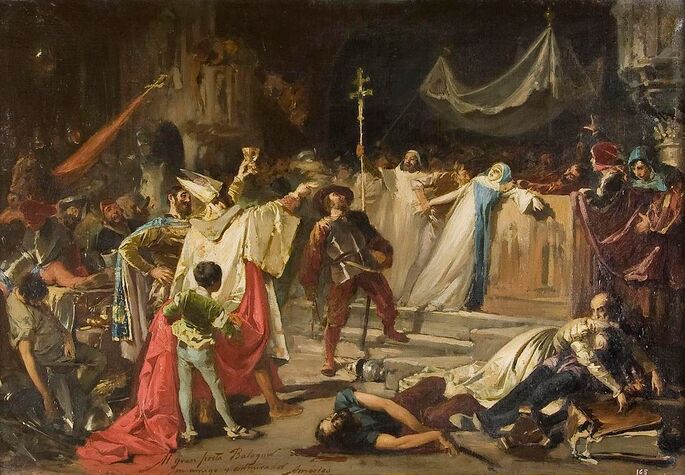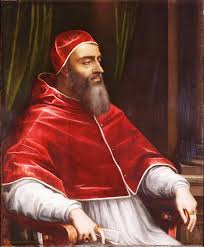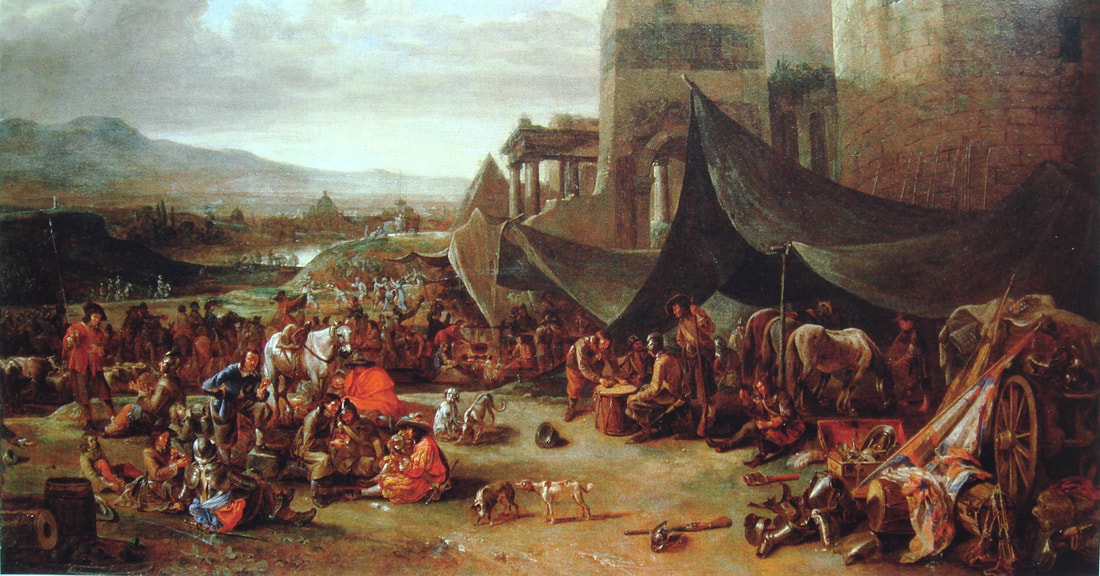Henry VIII,the Reign - Holinshed's Articles
By Mark Holinshed
Prisoner Puppet Pope
The Sack of Rome
In May 1527 a marauding army, latterly under the command of the Duke of Bourbon, a Frenchman who had defected to serve Charles V, Holy Roman Emperor, sacked Rome.
Bourbon was killed early in the attack, after which the leaderless army looted and destroyed monasteries, churches and the palaces of the clergy. Many of those who tried to defend the city suffered gruesome execution. Pope Clement himself was destined for the same fate, but he escaped along the Passetto di Borgo, an elevated passage that linked (indeed still does link) Vatican City to Castel Sant’Angelo. There he made himself safe with a few of his aides.
In May 1527 a marauding army, latterly under the command of the Duke of Bourbon, a Frenchman who had defected to serve Charles V, Holy Roman Emperor, sacked Rome.
Bourbon was killed early in the attack, after which the leaderless army looted and destroyed monasteries, churches and the palaces of the clergy. Many of those who tried to defend the city suffered gruesome execution. Pope Clement himself was destined for the same fate, but he escaped along the Passetto di Borgo, an elevated passage that linked (indeed still does link) Vatican City to Castel Sant’Angelo. There he made himself safe with a few of his aides.

In December Clement escaped and then fled seventy-five miles north to Orvieto, a city built on the flat summit of a volcanic rock. For centuries Orvieto, in those days surrounded by,swamp had been a papal refuge in times of adversity.
Charles V, who was Queen of England Catherine of Aragon’s nephew ,denied responsibility for the Sack,( he would wouldn’t he ) but it was his army that confined the pope to the old palace there in Orvieto.
A Desperate Delegation
Clement received a delegation from England.
Acting on instructions drawn up by Cardinal Thomas Wolsey, they came to negotiate terms to proceed to an annulment of Catherine's marriage to Henry VIII. The annulment, if granted, would have humiliated Charles, who was also, among all other things, the most powerful man in Christendom. Wolsey, who had convinced Henry VIII that he could secure an annulment was losing credibility with the king.
Charles V, who was Queen of England Catherine of Aragon’s nephew ,denied responsibility for the Sack,( he would wouldn’t he ) but it was his army that confined the pope to the old palace there in Orvieto.
A Desperate Delegation
Clement received a delegation from England.
Acting on instructions drawn up by Cardinal Thomas Wolsey, they came to negotiate terms to proceed to an annulment of Catherine's marriage to Henry VIII. The annulment, if granted, would have humiliated Charles, who was also, among all other things, the most powerful man in Christendom. Wolsey, who had convinced Henry VIII that he could secure an annulment was losing credibility with the king.

Pope Clement VII

Headed by Stephen Gardiner, later Bishop of Winchester and Edward Fox later Bishop of Hereford, the delegation arrived out of the swamp, half drowned (one of their attendants did drown) on 20 March 1528. So bedraggled were they that they were forced to tarry for two days before seeing the pope while new “garments were at the making”.
A Desperate Pope
The pope was in little better shape. They reported back home that the city
‘'may well be called Urbs Vetus [Old City] for every man in all languages at his entry would give it none other name. We cannot well tell how the pope should be noted in liberty, being here where hunger scarcity, ill-favoured lodging, ill air, and many other in commodities, keep him and all his as straitly [as in dire straits] as he was ever kept in Castle Angel.
The pope lieth in an old palace of the bishops of this city, ruinous and decayed, where we come to his privy bedchamber, we pass three chambers, all naked and unhanged, the roof fallen down, and as we can guess, thirty persons, rif raf and other standing in the chambers for garnishment. And as for the pope’s bedchamber all the apparel in it was not worth twenty nobles [English coins], bed and all.”
Those were the conditions under which Henry VIII’s annulment was negotiated, with a pope who was Catherine of Aragon’s nephew’s prisoner. ‘we cannot well tell how the pope should be noted in liberty,’ said Foxe and Gardiner.
Whatever the arguments for the annulment of Henry VIII’s marriage, while Charles V was Holy Roman Emperor and ‘guardian’ of the pope Henry VIII’s matrimonial union with was until death, Charles would see to that.
Unless of course, England rejected papal authority.
This was an impossible mission, contrived by Cardinal Thomas Wolsey in the twilight of his 'reign'. A little over a year later Stephen Gardiner replaced the cardinal as the king's secretary - and the pope never did annul Henry and Catherine's marriage
A Desperate Pope
The pope was in little better shape. They reported back home that the city
‘'may well be called Urbs Vetus [Old City] for every man in all languages at his entry would give it none other name. We cannot well tell how the pope should be noted in liberty, being here where hunger scarcity, ill-favoured lodging, ill air, and many other in commodities, keep him and all his as straitly [as in dire straits] as he was ever kept in Castle Angel.
The pope lieth in an old palace of the bishops of this city, ruinous and decayed, where we come to his privy bedchamber, we pass three chambers, all naked and unhanged, the roof fallen down, and as we can guess, thirty persons, rif raf and other standing in the chambers for garnishment. And as for the pope’s bedchamber all the apparel in it was not worth twenty nobles [English coins], bed and all.”
Those were the conditions under which Henry VIII’s annulment was negotiated, with a pope who was Catherine of Aragon’s nephew’s prisoner. ‘we cannot well tell how the pope should be noted in liberty,’ said Foxe and Gardiner.
Whatever the arguments for the annulment of Henry VIII’s marriage, while Charles V was Holy Roman Emperor and ‘guardian’ of the pope Henry VIII’s matrimonial union with was until death, Charles would see to that.
Unless of course, England rejected papal authority.
This was an impossible mission, contrived by Cardinal Thomas Wolsey in the twilight of his 'reign'. A little over a year later Stephen Gardiner replaced the cardinal as the king's secretary - and the pope never did annul Henry and Catherine's marriage